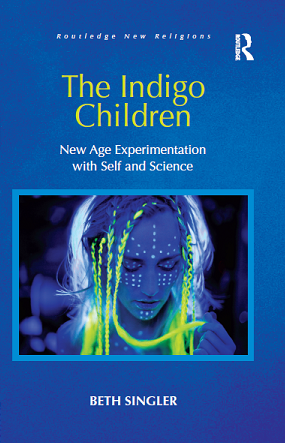
Submitted by Administrator on Wed, 06/09/2017 - 11:47
Dr. Beth Singler's new book will be published on 21st September 2017. It is based on research from her PhD in Theology and Religious Studies.
Beth Singler is a Post-Doctoral researcher at the Faraday Institute for Science and Religion at the University of Cambridge, where she is using digital and non-digital ethnographic methods to consider contemporary developments in Artificial Intelligence and robotics and their implications for both human identity and for the continuation of religious ideas and narratives. The Indigo Children: New Age Experimentation with Self and Science continues her research into 21st Century New Religious Movements, and other areas on which she has been published include Jediism, Scientology, Paganism, and the Pro-Ana movement.
The Indigo Child concept is a contemporary New Age redefinition of self. Indigo Children are described in their primary literature as a spiritually, psychically, and genetically advanced generation. Born from the early 1980s, the Indigo Children are thought to be here to usher in a new golden age by changing the world’s current social paradigm. However, as they are "paradigm busters", they also claim to find it difficult to fit into contemporary society. Indigo Children recount difficult childhoods and school years, and the concept has also been used by members of the community to reinterpret conditions such as Attention Deficit Hyperactive Disorder (ADHD) and autism. Cynics, however, can claim that the Indigo Child concept is an example of "special snowflake" syndrome, and parodies abound.
This book is the fullest introduction to the Indigo Child concept to date. Employing both on- and offline ethnographic methods, Beth Singler objectively considers the place of the Indigo Children in contemporary debates around religious identity, self-creation, online participation, conspiracy theories, race and culture, and definitions of the New Age movement.
Further information about the book can be found at Routledge.com, the publisher's site, and Amazon.
